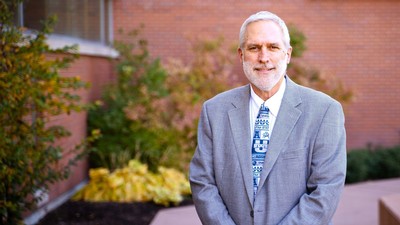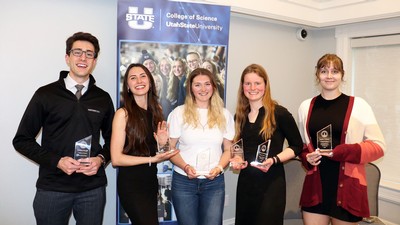National Equine Therapy Training at Utah State University
By Alyssa Stastny |
Utah State University hosted an American Hippotherapy Association (AHA) course for licensed physical therapists, occupational therapists and speech language pathologists who use hippotherapy in treating clients.
Sometimes called equine-assisted therapy, hippotherapy involves using horses to facilitate therapeutic or rehabilitative treatment. This evidence-based therapy tool is effective due to the type of movement that riders experience while on the horse. Licensed therapists may choose to incorporate hippotherapy into a client’s care plan to achieve certain goals.
Jessica O’Brien, an occupational therapist who traveled from Texas to attend the course, shared that in her experience most people enjoy taking part in hippotherapy. She believes that “it feels less like therapy” to many clients, adding a sense of normalcy and inclusion to their lives.
The 3-day course included components in the classroom and in the arena, where attendees gained hands-on experience working with horses. AHA instructors focused on equine movement, horse/human interaction, safety and assessing horses with the client’s needs in mind.
“Each horse produces a different kind of movement, so that’s part of what they take into consideration when they choose which horse to incorporate for the patient’s care,” said Sherrie Petty, a staff member in USU’s Department of Animal, Dairy and Veterinary Sciences (ADVS).
Attendees also had the opportunity to put their knowledge to the test with two “paper clients.” After receiving written information about each of these clients, attendees created a treatment plan for the individual with the guidance of their instructors. On the final day of the course, those clients joined attendees for an actual therapy treatment session. Having just provided recommendations for treatment, this experience allowed attendees to gain unique insight as they observed the session.
Therapists traveled from around the world to participate, including a one from Dubai and another from Canada. Additionally, participants represented nearly all the western states. Judy Smith, assistant professor of equine-assisted activities and therapies at USU, said that having the course in Logan, Utah, provided a more accessible option for many professionals in the western United States.
The course also offered attendees continuing education credits needed to maintain a current license. Attendees had a wide variety of experience levels, with some achieving licensure as little as 3 months earlier and others having worked in the profession for 20 years.
WRITER
Alyssa Stastny
Development Research Assistant
Landscape Architecture and Environmental Planning/Animal Dairy & Veterinary Sciences
Alyssa.stastny@usu.edu
CONTACT
Judy Smith
Assistant Professor of Equine-Assisted Activities and Therapies
Animal, Dairy, and Veterinary Sciences
405-760-9018
judy.smith@usu.edu
TOPICS
Health 309stories Animals 90stories Solutions 64stories Vet Sciences 62storiesComments and questions regarding this article may be directed to the contact person listed on this page.










